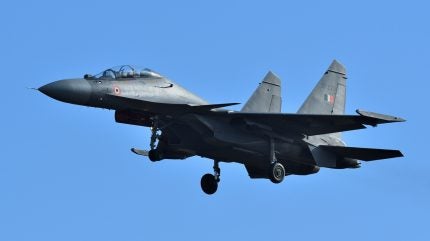
The Indian Ministry of Defence (MoD) and Hindustan Aeronautics Limited (HAL) have formalised an agreement for the acquisition of 12 Su-30MKI aircraft with related systems.
The contract has an estimated value of Rs135bn ($1.56bn) inclusive of taxes and duties.
The order marks a significant step towards self-reliance in defence under the ‘Aatmanirbhar Bharat’ initiative, with the jets incorporating 62.6% indigenous components, a figure that reflects the increased localization of numerous parts now produced by the Indian defence sector.
As part of the contract, HAL’s Nasik division will be responsible for manufacturing these Su-30MKI aircraft and its associated equipment.
The jets are expected to bolster the operational capabilities of the Indian Air Force and enhance the nation’s overall defence readiness.
The latest fleet will feature advanced avionics, electronic warfare systems, and weaponry.

US Tariffs are shifting - will you react or anticipate?
Don’t let policy changes catch you off guard. Stay proactive with real-time data and expert analysis.
By GlobalDataThis acquisition forms part of an extensive modernisation effort that includes the ‘Super Sukhoi’ project to upgrade 84 existing Su-30MKIs, equipping them with advanced technologies, reported Indian Today.
Some of the features of the upgraded Su-30MKI jets include next-generation Active Electronically Scanned Array (AESA) radar, advanced avionics, and a digital cockpit.
The aircraft’s weaponry will be augmented by the addition of BrahMos-A cruise missiles, Astra Beyond Visual Range (BVR) missiles, and precision-guided munitions.
In October, HAL delivered the inaugural AL-31FP Aero Engine, which falls under a contract for 240 such engines for Su-30MKI jets. The contract for these engines was inked on 9 September 2024, with delivery spread over an eight-year period.
Over the last two decades, 12 Su-30MKIs were lost in accidents.
During the same month, Tata Advanced Systems and Airbus commissioned a new Final Assembly Line (FAL) complex for the Airbus C295 aircraft in Vadodara in the Indian state of Gujarat.
The launch follows three years after the IAF formalised the acquisition of 56 Airbus C295 aircraft to replace its AVRO fleet.



